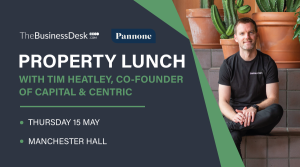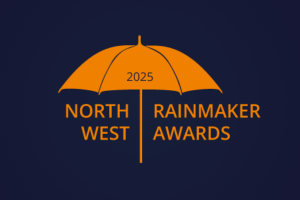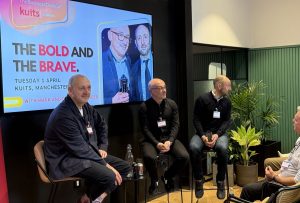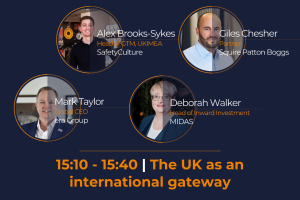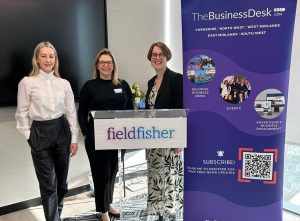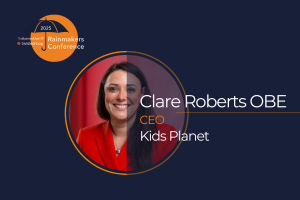How to nourish an innovation ecosystem
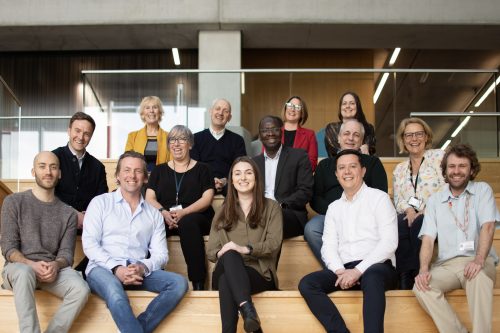
Every industrial strategy, every ambitious vision statement from a city, every political manifesto or policy paper talks about how universities need to step up and play their part in wealth creation and working closer with business.

Another phrase that gets bandied around a lot is ecosystem. How one thing thrives because it feeds off something else, and so the logic goes, many flowers can then bloom.
TheBusinessDesk.com wants to dig a little deeper into how this is working in practice. As a first foray into this space we worked with Manchester Metropolitan University on a round table that brought together stakeholders from business, civic support, venture capital and, crucially, the bits where academia really touches business, notably in Knowledge Transfer Partnerships (KTPs), where a business hires an academic researcher to solve a business challenge.
What emerged were some fascinating stories about the impact that KTPs have had on individual businesses.
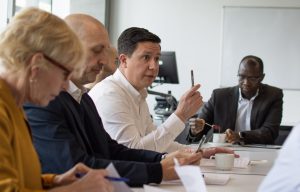
Fiona Nighingale, Michael Taylor, John Willis and Dele Adebesi
As John Willis, partnerships manager at the university, said in summing up, what’s really important about these collaborations (KTPs, mainly) is that they like a taster menu. “They are a foundation for longer term, strategic relationships that can lead to further research projects or other aspects of the services and support that we offer, particularly careers and employability,” he said.
“There is infrastructure and an innovation ecosystem that exists within Greater Manchester. We’ve seen today how we can contribute to that ambition to increase the number of businesses that are investing in research and development and increase the number of businesses that are improving their productivity and being innovative.”
But let’s look at what led Willis to get to that conclusion, before we then look at the next obvious question. If KTPs can inspire the levels of enthusiasm from all sides, why don’t more businesses do them more often?
First, the evidence from our expert witnesses in business, starting with Richard Rowlands from Hyvert, trading as I Want Plants, a business that builds living walls into commercial buildings and contributes to their efficiency and biodiversity, and carbon offsetting. Something he admits that may be seen as a luxury a strapped business can’t afford.
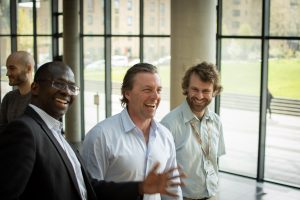
Professor Dele Adebesi, Richard Rowlands and Dave Megson
“The problem with the horticultural industry as a whole is there’s no quantifiable science, it’s all assumptions. When you come across a difficult financial director or someone who asks why they should spend 100,000 credits? There’s no tangible information. Ours is by far the best system and looks the best, we make it in the UK and it’s made of recycled batteries. But there was only me saying it. With MMU and (Professor) Bamidele Adebisi by my side, it’s harder arguing with the number one sustainable university who have run a report with bigger clients of ours recently, making the case for what 400 square metres would achieve in biodiversity points BREEAM (Building Research Establishment Environmental Assessment Method), noise abatement, thermal abatement.
“But the stuff that we’ve learned has had a commercial advantage and it’s just amazing for us.”
Next, Paul Carrington, managing director, Aquacheck, who describes his company as an old fashioned engineering business in the water sector that has been transformed by embracing a deeper pursuit of solutions to tough problems through research.
“We kicked the can down the road for many years as we tried to get funding into our business. How do we create a business with value and innovation?”
He was sold on the idea of a KTP but says the best advice he got was to get the finance director sold on the idea early in the process. “You say to a finance director, look guys, it’s going to cost us 30 grand a year but look at tax credits, the corporation tax advantages. It’s led us to do three KTPs and the value of our business now has increased by a factor of 10.
“We now have three world firsts in one of our businesses, we’re a supplier to Severn Trent, an £8 billion turnover FTSE 100 company.
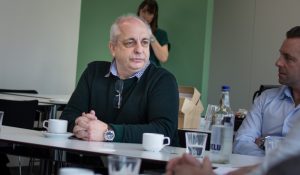
Paul Carrington
“I think you have to decide, are you a legacy business or a lifestyle business. If you’re a lifestyle business, maybe it’s not for you. But if you want to leave something for the next generation, then that’s where we need to all be. And that’s been our journey.”
But while Aquacheck and Hyvert have that science base to their business, for Tom Mathew, the commercial director of food producer Dunsters Farm, the incentive was a business process issue, digital transformation, at least initially.
“We are in a very sort of volatile world, increasingly, we’ve changed tack and needed to address automation transformation and to be more flexible.”
He says the attitude towards sustainability in food has also changed since he started embracing KTPs. “When we drew it up, the green sustainability piece was much smaller. But now it’s much larger, because that has happened over the last sort of three or four years that has really come to the fore.”
Next, the fertilisers of the innovation ecosystem. It seems trite to describe Bruntwood SciTech as just a property company, indeed, as Deb Hetherington their head of innovation services said, she doesn’t really get involved in the property side. “It’s more ensuring we’ve got the right innovation ecosystems within campuses and districts that we develop. We create a lot of that ourselves, but a lot is also curating. So we work with universities generating a sort of triple helix model, which is industry, university and local government to ensure that all services provided from those entities are filtered through to the businesses based on our campuses and also being part of the ecosystems in which we operate. I’m also an associate at Leeds. Trying to sell Knowledge Transfer Partnerships is really the dream for me.”
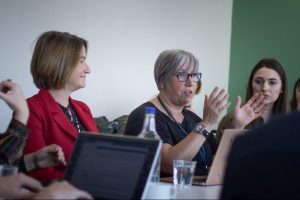
Deb Hetherington, Yvonne Grady and Ellie Boardman
Likewise, Yvonne Grady, head of innovation at the Business Growth Hub says she’s spent the last seven years trying to educate businesses on the advantages of working with a university on their doorstep. “They might think of universities as places that teach their kids, but they have no idea what the facilities are here. So we proactively go out and promote the concept of collaboration, not necessarily KTP, because that’s just a vehicle for collaboration. So we look at gaps in the market around early stage funding, testing validation on small stage feasibility research.”
She’s part of The Growth Company which also runs an innovation cloud which helps everybody with 50 per cent towards a cost, intended for somebody who’s never collaborated with an academic institution. “So actually know whether you’re doing a small testing project for a few 1000 pounds on acoustical thermal, or whatever that is. It slowly introduces you to academia, by carrying out a small, independent project, but done with having the stats because they’re huge. But by doing one small project that then goes larger and larger, it builds that confidence,” she says.
An important factor in the business and innovation ecosystem is venture finance and Ellie Boardman from DSW Capital said the discussion was an eye opener for her, with many early stage companies that she hears from on a daily basis, “it would be absolutely perfect for them to support innovation with research in universities”.

Ellie Boardman
She is inundated with proposals and investment decks and needs evidence of intent, which could inform an investment decision. “So actually, as an investor, I’m thinking I should be looking at the companies we’re investing in and suggesting KTPs to them.”
Fiona Nightingale, innovation consultant, and one of the driving forces behind Manchester Met’s position as a leading delivery university for KTPs reflects that businesses and universities have to also make the case for this unique win win.
“What we need to do is influence government to show how successful these collaborations. The gearing that you get on the public money investment for the benefit on the bottom line of the company’s profitability is very significant. We need to actually influence not only companies to be more aware that a KTP is ideally positioned for them to do something which isn’t going to give them an answer tomorrow, but it will give them an answer in two to three years time for them to start to really commercialise.”
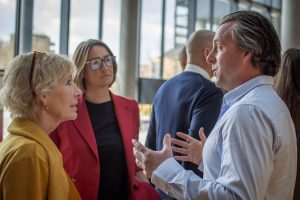
Fiona Nightingale, Deb Hetherington and Richard Rowlands
So it’s those, that community, which she says is a significant subset of the total business community in this region that needs to be identified.
“And we need to embrace those academics who really want to get out there and work with businesses,” she adds.
On that note, to make any partnership work, the advantages have to play out both ways, for a senior academic in the engineering world, like Bamidele Adebisi Professor of Intelligent Infrastructure Systems at Manchester Metropolitan University, he sees the application of real world solutions exciting.
“Companies come and challenge us. You think you are very clever, but they help you to see the bigger picture, expand your horizon of your brain. And so that’s what I find very interesting with KTPs.”
His colleague David Megson, a reader in Chemistry and Environmental Forensics at Manchester Met says: “I think that Dele captured it really well, it’s just so refreshing to be involved in a real life problem. Instead, as academics, we’re very much pigeon holed, and we do this very specific bit that was focused on our PhD and, and that’s what people kind of come to us to have in the academic environment. You write a paper, we go to a conference, there’s 20 people sat in a room and we all get a little clap at the end.
“And then with a KTP you get the opportunity to collaborate with businesses who have a real world problem, and you help them solve that. And you can see how the infrastructure of Manchester changes and how the world’s becoming a better place based on what you’ve done with your science.”

Corrado Puntillo
Likewise Corrado Puntillo, senior electronics design engineer at Pure O2, started his journey as a researcher attached to the medical devices company through a KTP, as a means to progress his PhD, but it became something more. “I had a great experience, even despite challenges around COVID, but the proof is that now I’m still working for the company. And I want to see how the project evolves in the next few years. And I want to be part of the transformation, which I started, from being a passive provider into an active provider of their own products and developing their own products. When we started we didn’t know anything about the issue we were going to face. And now we are about to go through our validation process of our devices to meet the European and British Standards.”
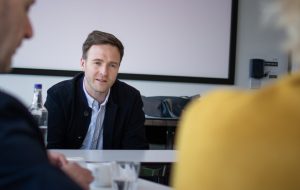
Tom Mathew
By way of a word of caution, Tom Mathew from Dunsters Farm says his advice back to the higher education sector, and the likes of the Growth Company who broker these partnerships is language. “People within the KTP world know a lot, because it’s their world. But I think just making that effort to speak to businesses, to get feedback and making it more accessible in certain ways. I’d been through university and I understood that kind of academic world. Whereas I think businesses where the leaders hadn’t, would have really struggled.”
His experience, he stresses, has been a wholly positive one.
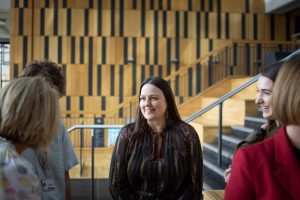
Dharma Nurse
Dharma Nurse knows the scale of the task she has in persuading businesses as awareness is quite low. “We’re now equipped with the knowledge and experiences to take them through what a KTP is, what the benefits are. And just how good value for money they are.
“It can be a little bit daunting sometimes, to actually even break it down, we go through everything that the business could get, and these long term transformational kind of big projects, we can identify when they’re ripe for it, you know, when they’re ready to apply, we can do all that groundwork and help support and so for us, it’s been key to get the word out there.”
And there’s certainly no shortage of advocates if this session is anything to go by.

